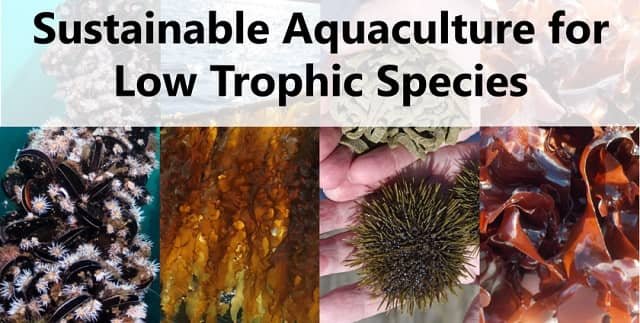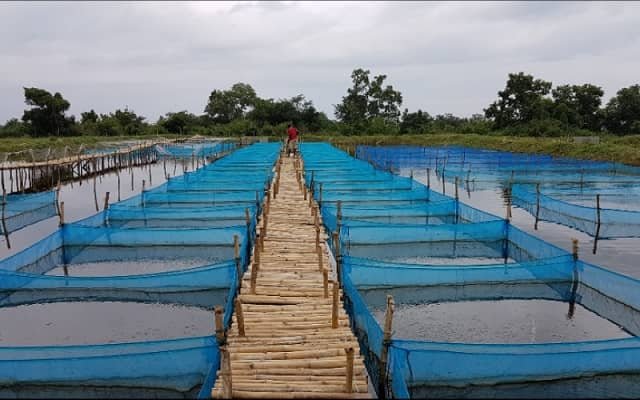
by AquaVitae
Sustainable Aquaculture for Low Trophic Species (SALTS) MOOC was officially launched at AquaVitae´s 4th annual meeting! The coordinator of the MOOC, Adrianna Kochanska (researcher at UiT), Michaela Aschan (professor at UiT), and Katrín Hulda (specialist at Matis OHF) launched the course during the first day of the AquaVitae meeting (April 17th) in Florianópolis, Brazil.
Increasing food production to ensure food security for the growing population is one of the most urgent challenges we are currently facing. Food coming from marine aquaculture is known to have some of the lowest carbon food print among animal products. Moreover, producing marine food at a lower trophic level further explores ecosystem services, which are fundamental to creating a sustainable food system.
Sustainable Aquaculture for Low Trophic Species (SALTS) MOOC
The SALTS MOOC was developed within the framework of the AquaVitae project. The UiT team, Adrianna Kochanska, Michaela Aschan, and Ronan Gombau, took on a leading role focusing on the design, pedagogical approach and development of the course material while coordinating the work of over 55 individual contributors from research, academia, and industry.
The course was born as a result of the limited educational resources available on low trophic aquaculture: ‘We want to create learning opportunities to increase the expertise within this important area for the future’, says Professor Michaela Aschan.
The course provides a holistic view of the most recent developments in low trophic aquaculture, focusing on selected groups of species molluscs, echinoderms, macroalgae and freshwater finfish. It explores various cultivation practices, including the Integrated Multitrophic Aquaculture. However, while knowing the cultivation practices is essential to understanding low trophic aquaculture, topics such as sustainability, governance, economic feasibility or climate change adaptation are fundamental to its success. This course provides interdisciplinary knowledge on low trophic aquaculture, allowing the students to hand pick topics of interest and explore them further through additional reading suggested throughout the course.
‘AquaVitae is a collection of brilliant experts in their respective fields, this was an opportunity to create a truly interdisciplinary and international course gathering case studies and experiences related to cultivating low trophic species from Europe, South Africa and Brazil’, adds Adrianna Kochanska.
The course consists of 11 modules focusing on the biology and production practices of low trophic species studied within the project, but also on related aquaculture topics, such as culture systems, sustainability, seafood safety, governance and business economics. After each topic, students are asked to complete an assessment to check their knowledge.
‘There are great expectations for increased aquaculture production, but if it is to be sustainable, we have to utilize species that are at a low level in the food pyramid in the marine ecosystem’, says Aschan.

The course is for:
Stay Always Informed
Join our communities to instantly receive the most important news, reports, and analysis from the aquaculture industry.
- Advanced undergraduates and graduate students in aquaculture, sustainable development, sustainable business, biology and other related fields
- Current and future practitioners in the aquaculture, fisheries and food sectors who wish to gain insights into current production practices and future trends as well as sustainable development and business opportunities in low trophic aquaculture.
- Educators who wish to go beyond their level of expertise and expand their classroom activities by introducing a “flipped classroom” – where students learn online while bringing the homework to class to discuss with fellow students.
The course contributes to international collaboration and diversification of education both at Master level. It is free, it has an interdisciplinary approach and it allows the student to register anytime and progress at their own pace. Upon completion, the student will receive a certificate if 60% the assessments are successfully passed. Students holding a European bachelor’s degree can receive an additional 5ECT if they register as a student at UiT. UiT charges a semester fee of approximately 40 EURO. This fee gives students access to all courses at UiT (where they are qualified).
Editor at the digital magazine AquaHoy. He holds a degree in Aquaculture Biology from the National University of Santa (UNS) and a Master’s degree in Science and Innovation Management from the Polytechnic University of Valencia, with postgraduate diplomas in Business Innovation and Innovation Management. He possesses extensive experience in the aquaculture and fisheries sector, having led the Fisheries Innovation Unit of the National Program for Innovation in Fisheries and Aquaculture (PNIPA). He has served as a senior consultant in technology watch, an innovation project formulator and advisor, and a lecturer at UNS. He is a member of the Peruvian College of Biologists and was recognized by the World Aquaculture Society (WAS) in 2016 for his contribution to aquaculture.






